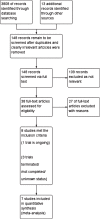Efficacy of Antidepressants for Depression in Alzheimer's Disease: Systematic Review and Meta-Analysis
- PMID: 28505970
- PMCID: PMC5467718
- DOI: 10.3233/JAD-161247
Efficacy of Antidepressants for Depression in Alzheimer's Disease: Systematic Review and Meta-Analysis
Abstract
Background: Depression is common in people with Alzheimer's disease (AD) affecting overall outcomes and decreasing quality of life. Although depression in AD is primarily treated with antidepressants, there are few randomized controlled trials (RCTs) assessing efficacy and results have been conflicting.
Objectives: To systematically review evidence on efficacy of antidepressant treatments for depression in AD.
Methods: Systematic review and meta-analysis of double blind RCTs comparing antidepressants versus placebo for depression in AD. We searched MEDLINE, CINAHL, EMBASE, PsycINFO, the Cochrane Controlled Trials Register and on line national and international registers. Primary outcomes were treatment response and depressive symptoms. Secondary outcomes were cognition, acceptability, and tolerability. Risk of bias was also assessed.
Results: Seven studies met inclusion criteria. Three compared sertraline with placebo; one compared both sertraline and mirtazapine to placebo; imipramine, fluoxetine, and clomipramine were evaluated in one study each. In terms of response to treatment (6 studies, 297 patients treated with antidepressants and 223 with placebo), no statistically significant difference between antidepressants and placebo was found (odds ratio (OR) 1.95, 95% CI 0.97-3.92). We found no significant drug-placebo difference for depressive symptoms (5 studies, 311 patients, SMD -0.13; 95% CI -0.49 to 0.24). Overall quality of the evidence was moderate because of methodological limitations in studies and the small number of trials.
Conclusion: Despite the importance of depression in people with AD, few RCTs are available on efficacy of antidepressants, limiting clear conclusions of their potential role. There is a need for further high quality RCTs.
Keywords: Alzheimer’s disease; Antidepressants; depression; effectiveness; meta-analysis; randomized controlled trials.
Figures







References
-
- Burns A, Iliffe S (2009) Dementia. BMJ 338, b75. - PubMed
-
- Knapp M, Comas-Herrera A, Wittenberg R, Hu B, King D, Rehill A, Adelaja B (2014) Scenarios of dementia care: What are the impacts on cost and quality of life? PSSRU Discussion Paper, 2878, Personal Social Services Research Unit, London, UK.
-
- Gaugler JE, Yu F, Krichbaum K, Wyman JF (2009) Predictors of nursing home admission for persons with dementia. Med Care 47, 191–198. - PubMed
Publication types
MeSH terms
Substances
LinkOut - more resources
Full Text Sources
Other Literature Sources
Medical
Miscellaneous

